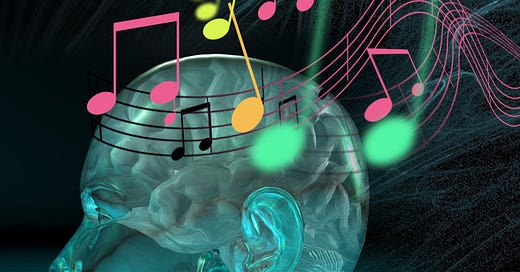“Perhaps the first point to be emphasized in a consideration of the influence of music in history is the fact that it made itself felt in much the same way in the primal ages as it does to-day. Music, considered as a historical influence, is primarily an emotional agent. Its influence is either directly exercised upon the senses, or, indirectly and by way of the feelings, on the mind. Sometimes it is an immediate influence, directly exercised; at others, it is the carrying medium for ideas, the fluid tonal amber in which these are vitalized and preserved.”
The Influence of Music in World History by Frederick H. Martens
The Musical Quarterly, Vol. 11, No. 2 (Apr., 1925), pp. 196-218 (23 pages)
Music is ingrained into our very reality. The nature of life is musical. Sound, as the Yogis say, is the fundamental creative force of existence. Sound is a composed of vibrations, just as all forms of energy, and thus it is with the lens of sound, along with sight, and other senses that we perceive life. Sounds combined in certain organizations and patterns make up what we call music. Generally, musicality is determined by consideration of rhythm, tone, melody, timbre and other such means of compartmentalizing the experience. It is apparent to anyone who spends time in nature, that life itself has musicality running through it constantly. The sound of the wind in the crackling autumnal leaves, the bees humming in search of pollen when things get warm, and the chittering and calling of innumerable creatures as they perform their daily routines. There is a deeper musical quality there, though not perhaps as readily perceivably musical by those who haven’t adapted their senses to hearing it.
“Somewhere along the evolutionary way, our ancestors, with very limited language but with considerable emotional expression, began to articulate and gesticulate feelings: denotation before connotation. But, as the philosopher Susanne Langer noted, ‘The most highly developed type of such purely connotational semantic is music’ (Langer, 1951, p. 93). In other words, meaning in music came to us before meaning given by words.”
Music and the brain: the neuroscience of music and musical appreciation - PMC (nih.gov)
In terms of our natural biorhythms, we are perfectly attuned to the environment without manipulation of meddling. From the wide Schumann Resonance to the Oxygen/Carbon exchange with plant life, to the hierarchy of the food chain, humanity is perfectly suited to the natural world. Sadly, we do not live in a world today of harmonic energies, especially in cities. Manipulations of our electromagnetic fields have distorted life drastically from its natural rhythms and patterns. This effect is represented in a thousand different ways, from the general apathy and loneliness of humanity to our increasing dis-ease. We find ourselves swimming in an ocean of environmental manipulations uncoupling us from our evolutionary and biological heritage and common wellbeing.
This is not the least represented in the way sound is being used. Composition of music from whatever the origin was to the time of the 20 century was largely made with an inherent understanding of the connectedness of the architecture of music to the wellbeing of the listener. Entering into the 20th century, we see a radicalization of the musical form into what is now called rock and roll and pop music, amongst others.
Keep reading with a 7-day free trial
Subscribe to Liberty Uncensored Newspaper to keep reading this post and get 7 days of free access to the full post archives.





